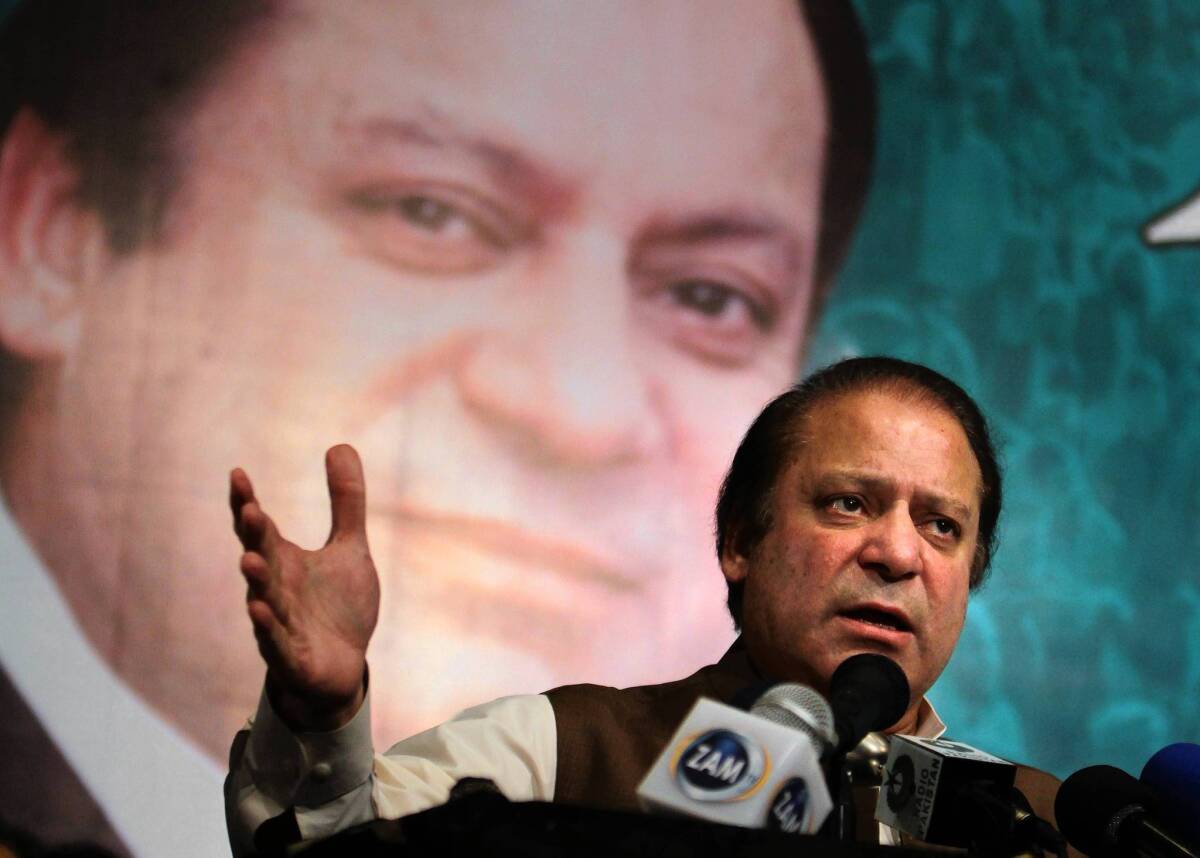Obama’s drone limits may bolster ties with Pakistan

- Share via
ISLAMABAD, Pakistan — President Obama’s commitment to scaling back the use of unmanned aircraft to kill suspected terrorists could pave the way for improved relations between the United States and Pakistan, analysts and political leaders said Friday.
But the Pakistani government maintained its insistence that the drone campaign does more harm than good and should be shut down.
Obama’s decision to continue using targeted killings abroad while imposing restrictions that could significantly reduce the frequency of drone strikes comes at a particularly sensitive time for Islamabad as it prepares for a new civilian government led by Nawaz Sharif, who served as prime minister in the 1990s.
In the wake of their party’s victory in national elections May 11, Sharif and his aides have been careful in their remarks, declaring opposition to the drone campaign — deeply unpopular in Pakistan — without appearing excessively confrontational to Washington, which Islamabad relies on for billions of dollars in military and economic aid.
One of Sharif’s advisors, Sen. Tariq Azeem, on Friday called the policy shift outlined by Obama in a speech a day earlier “a positive sign.”
“Apart from killing a few Al Qaeda terrorists, drones have caused immense damage to the image of the U.S.,” said Azeem, a member of Sharif’s Pakistan Muslim League-N Party. “If President Obama has had a rethink, I think it’s a welcome step.”
The United States has relied heavily on its controversial drone campaign to take out Al Qaeda and Taliban leaders holed up in Pakistan’s tribal regions, a swath of rugged territory along the Afghan border that Islamabad has never been able to fully control.
Since Obama took office in January 2009, the United States has carried out 293 drone strikes in northwestern Pakistan, according to the Long War Journal website. Several top Al Qaeda leaders have been killed in such strikes in recent years, including the terrorist network’s second in command, Abu Yahya al Libi, in June 2012.
Privately, commanders in Pakistan’s politically powerful military have acknowledged the utility of drone strikes in taking out top militant commanders and leaders. Under President Asif Ali Zardari’s administration, Pakistan has maintained a policy of publicly condemning drone strikes while tacitly allowing them to occur.
But the drone campaign has been one of the primary sources of friction in Washington’s tenuous relationship with Islamabad. Pakistanis view it as a blatant violation of their country’s sovereignty and say it has become a major recruiting tool for militants because of the number of civilians mistakenly killed in the strikes.
Foreign Ministry spokesman Aizaz Ahmad Chaudhry, in a statement released Friday, said Pakistan appreciated Obama’s remarks that “force alone cannot make us safer.”
The Pakistani government maintains that drone strikes “are counterproductive, entail loss of innocent civilian lives … and violate the principles of national sovereignty, territorial integrity and international law, “ said Chaudhry, a member of a caretaker government serving as a transition between Zardari’s administration and the incoming government led by Sharif, presumably as prime minister.
Analysts said that if the U.S. followed through on scaling back the drone program, it would help shield Sharif from public pressure on the issue as he begins tackling the country’s most pressing problems, including crippling power outages and a weak economy.
“This is a welcome development, especially if there’s great restraint applied during the initial months of the new government,” said Talat Masood, a security analyst and retired Pakistani general. “It won’t put the new government on the defensive.”
Reducing the frequency of strikes makes sense for Washington, which needs Pakistan’s help in facilitating peace talks with Taliban leaders in Afghanistan and in using Pakistani territory as a transit route for the withdrawal of most U.S. troops from the Afghan conflict by the end of next year.
Even before Obama’s speech Thursday, the number of drone strikes had fallen steadily. There have been 13 drone strikes in Pakistan’s tribal areas so far this year, compared with 64 in all of 2011 and 117 in 2010, according to the Long War Journal. Last year there were 46 U.S. drone strikes in the tribal belt.
“It’s a great opportunity for both countries to further improve their relations,” Masood said. “And it’s in the U.S. interests to be more sensitive about drones. Pakistan-U.S. relations are at a critical stage, and the upcoming withdrawal from Afghanistan makes it even more important.”
Vali Nasr, a former State Department senior advisor on Pakistan, said that while most Pakistanis would welcome new limits on drone use, Obama stopped far short of offering what Pakistanis really want, which is some control over the use of the weapons in their country.
“He got the program out in the open, put limits on it and explained the U.S. view, and all that’s positive,” said Nasr, dean of the Johns Hopkins University School of Advanced International Studies. “But he didn’t provide a role for the people in the countries where the drones are used.”
Times staff writer Paul Richter in Washington contributed to this report.
More to Read
Sign up for Essential California
The most important California stories and recommendations in your inbox every morning.
You may occasionally receive promotional content from the Los Angeles Times.










